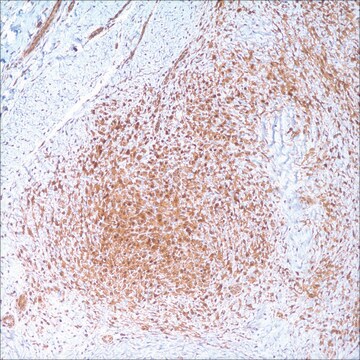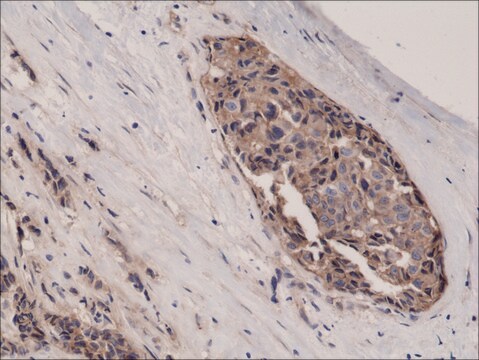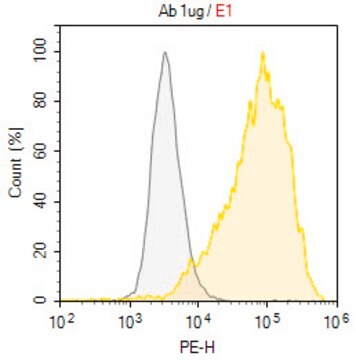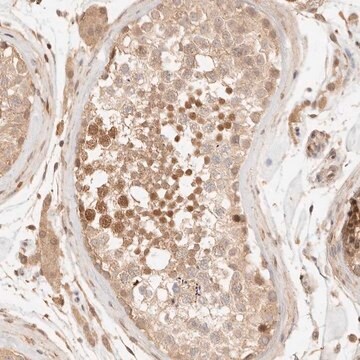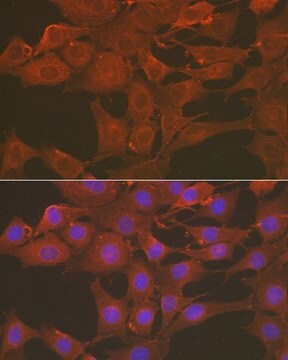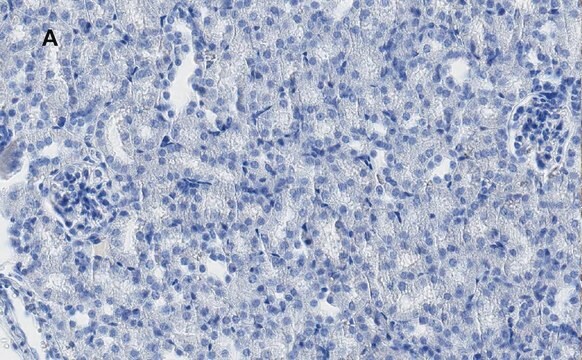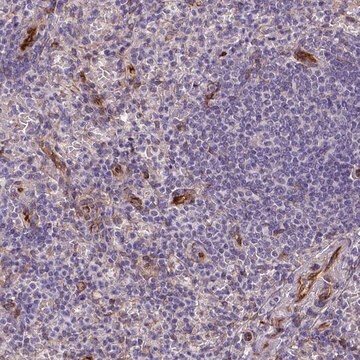ZRB1837
Anti-Phospho-c-Jun (Ser73) Antibody, clone 2B14 ZooMAb® Rabbit Monoclonal

recombinant, expressed in HEK 293 cells
Sinónimos:
Transcription factor AP-1 (UniProt: P05412; also known as Activator protein 1, AP1, Proto-oncogene c-Jun, V-jun avian sarcoma virus 17 oncogene homolog, p39
About This Item
Productos recomendados
origen biológico
rabbit
Nivel de calidad
recombinante
expressed in HEK 293 cells
conjugado
unconjugated
forma del anticuerpo
purified antibody
tipo de anticuerpo
primary antibodies
clon
2B14, recombinant monoclonal
descripción
2B14 Clone
Línea del producto
ZooMAb® learn more
formulario
lyophilized
mol peso
calculated mol wt 35.68 kDa
observed mol wt ~40 kDa
purificado por
using Protein A
reactividad de especies
mouse, human
reactividad de especies (predicha por homología)
monkey, canine, bovine, rat, horse, zebrafish, porcine
envase
antibody small pack of 25 μL
características de los productos alternativos más sostenibles
Waste Prevention
Designing Safer Chemicals
Design for Energy Efficiency
Learn more about the Principles of Green Chemistry.
validación mejorada
recombinant expression
Learn more about Antibody Enhanced Validation
sustainability
Greener Alternative Product
técnicas
affinity binding assay: suitable
flow cytometry: suitable
immunohistochemistry: suitable
inhibition assay: suitable
western blot: suitable
isotipo
IgG
secuencia del epítopo
N-terminal half
Nº de acceso Protein ID
Nº de acceso UniProt
categoría alternativa más sostenible
Condiciones de envío
ambient
temp. de almacenamiento
2-8°C
modificación del objetivo postraduccional
phosphorylation (pSer73)
Información sobre el gen
human ... JUN(3725)
Descripción general
Especificidad
Inmunógeno
Aplicación
Evaluated by Western Blotting in lysates from NIH3T3 cells treated with UV light.
Western Blotting Analysis (WB): A 1:1,000 dilution of this antibody detected Phospho-c-Jun (Ser73) in lysates from NIH3T3 cells treated with UV light (50 mJoules followed by 5 h recovery), but not in untreated cells.
Tested Applications
Flow Cytometry Analysis: 0.1 μg from a representative lot detected Phospho-c-Jun (Ser73) in one million HeLa cells treated with UV light
Immunohistochemistry (Paraffin) Analysis: A 1:100 dilution from a representative lot detected Phospho-c-Jun (Ser73) in human colon tissue sections.
Peptide Inhibition Assay: Target band detection in lysates from NIH3T3 cells was prevented by preblocking of a representative lot with the Phospho-c-Jun (Ser73) peptide, but not the corresponding non-phosphopeptide.
Affinity Binding Assay:: A representative lot of this antibody bound Phospho-c-Jun (Ser73) peptide with a KD of 4.5 x 10-7 in an affinity binding assay.
Immunocytochemistry Analysis: A 1:1,000 dilution from a representative lot detected Phospho-c-Jun (Ser73) in HeLa cells treated with UV light.
Note: Actual optimal working dilutions must be determined by end user as specimens, and experimental conditions may vary with the end user
Descripción de destino
Forma física
Reconstitución
Almacenamiento y estabilidad
Información legal
Cláusula de descargo de responsabilidad
¿No encuentra el producto adecuado?
Pruebe nuestro Herramienta de selección de productos.
Código de clase de almacenamiento
11 - Combustible Solids
Clase de riesgo para el agua (WGK)
WGK 1
Punto de inflamabilidad (°F)
Not applicable
Punto de inflamabilidad (°C)
Not applicable
Certificados de análisis (COA)
Busque Certificados de análisis (COA) introduciendo el número de lote del producto. Los números de lote se encuentran en la etiqueta del producto después de las palabras «Lot» o «Batch»
¿Ya tiene este producto?
Encuentre la documentación para los productos que ha comprado recientemente en la Biblioteca de documentos.
Nuestro equipo de científicos tiene experiencia en todas las áreas de investigación: Ciencias de la vida, Ciencia de los materiales, Síntesis química, Cromatografía, Analítica y muchas otras.
Póngase en contacto con el Servicio técnico